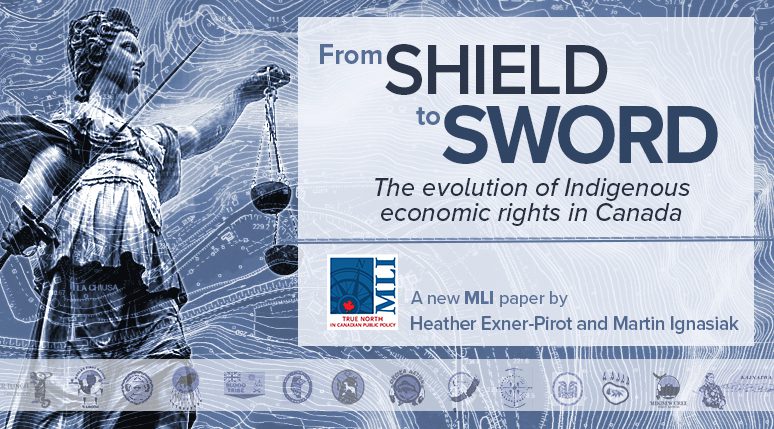OTTAWA, ON (February 15, 2023): Indigenous Canadians have been historically marginalized in decision-making around land use and resource development in their territories. However, the Supreme Court of Canada has since clarified and empowered Indigenous communities by affirming the Crown’s duty to consult and accommodate Indigenous rights holders in these matters.
In a new MLI paper titled From shield to sword: The evolution of Indigenous economic rights in Canada, Senior Fellow Heather Exner-Pirot and Martin Ignasiak shed light on the evolution of Indigenous economic rights in Canada and the impact on resource development in the country.
“Many Indigenous communities have determined that it is in their interests to pursue economic benefits through resource development in the form of royalties, payments, employment, business contracts, and even equity positions,” note Exner-Pirot and Ignasiak. “They are now turning to the Courts to protect those interests, and are starting to find success.”
The authors explore recent Court decisions and argue that Indigenous rights have evolved from being a shield for proponents (their consent and support reducing the risk of a legal challenge based on Indigenous rights) to being a sword for proponents, including Indigenous proponents (Indigenous consent and support limiting the ability of governments to reject those projects).
According to Exner-Pirot and Ignasiak, a constructive approach on behalf of federal and provincial governments would entail recognizing that regulatory processes should facilitate the advancement of projects supported by Indigenous groups. Such an approach is critical for alleviating the difficult economic conditions that many Indigenous communities face.
A decision to deny a project despite it being supported by that community means that the historical injustices inflicted on that community will be perpetuated. Thus, to the extent that a government agency or regulator intends to deny a project that is supported by the most affected Indigenous communities, it should at a minimum be required to explain how this denial is consistent with reconciliation and to what extent other economic opportunities of similar scale may exist for those communities.
In the past, environmental groups have often focused on the concerns of Indigenous communities opposing a project. Those same groups are now less supportive of Indigenous economic rights when Indigenous communities support resource development. Yet the courts agree that reconciliation, which includes facilitating Indigenous participation in and benefit from resource development, should be prioritized over other policy objectives.
“Indigenous support for a project, based on the economic benefits and advancement the project provides, should be subject to the same constitutional deference as the traditional rights to hunt and trap,” conclude the authors. “This is a good thing if we are going to seriously advance reconciliation in Canada.”
To learn more, read the full paper here:
***
Heather Exner-Pirot is a Senior Fellow and Director of the Natural Resources, Energy and Environment Program at MLI.
Martin Ignasiak K.C. is a Partner at Bennett Jones and Co-Head of Energy Regulatory Practice. He works closely with clients across Canada in developing and executing strategies for obtaining regulatory approvals for large scale industrial projects—including mines, oil & gas, pipelines, and electric generation facilities.
For further information, media are invited to contact:
Skander Belouizdad
Communications Officer
613-482-8327 x111
skander.belouizdad@macdonaldlaurier.ca







